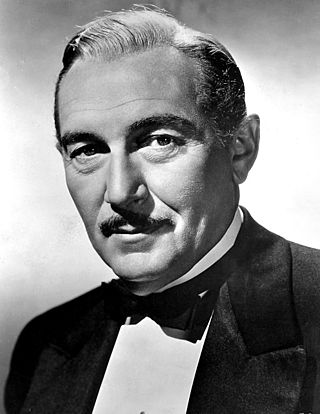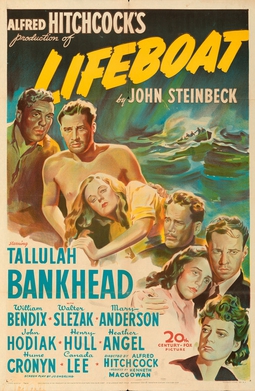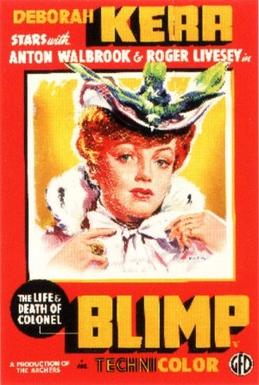This is a list of the most notable films produced in the Cinema of Germany in 1943.
This is a list of the most notable films produced in the Cinema of Germany in 1943.
| Title | Director | Cast | Genre | Notes |
|---|---|---|---|---|
| Armer Hansi | Frank Leberecht | animation | ||
| Dornröschen | Ferdinand Diehl | animation | ||
| Hochzeit im Korallenmeer | Horst von Möllendorff | animation | Made by Czechs in occupied Prague | |
| Strich-Punkt-Ballett | Herbert Seggelke | animation | ||
| Verwitterte Melodie | Hans Fischerkoesen | Animation | Weather-beaten Melody | |

Why We Fight is a series of seven propaganda films produced by the US Department of War from 1942 to 1945, during World War II. It was originally written for American soldiers to help them understand why the United States was involved in the war, but US President Franklin Roosevelt ordered distribution for public viewing.

To Be or Not to Be is a 1942 American black comedy film, directed by Ernst Lubitsch, starring Carole Lombard and Jack Benny, and featuring Robert Stack, Felix Bressart, Lionel Atwill, Stanley Ridges and Sig Ruman. The plot concerns a troupe of actors in Nazi-occupied Warsaw who use their abilities at disguise and acting to fool the occupying troops. It was adapted by Lubitsch (uncredited) and Edwin Justus Mayer from the story by Melchior Lengyel. The film was released one month after actress Carole Lombard was killed in an airplane crash. In 1996, it was selected for preservation in the United States National Film Registry by the Library of Congress as being "culturally, historically, or aesthetically significant."

Ernst Lubitsch was a German-born American film director, producer, writer, and actor. His urbane comedies of manners gave him the reputation of being Hollywood's most elegant and sophisticated director; as his prestige grew, his films were promoted as having "the Lubitsch touch". Among his best known works are Trouble in Paradise (1932), Design for Living (1933), Ninotchka (1939), The Shop Around the Corner (1940), To Be or Not to Be (1942) and Heaven Can Wait (1943).

Paul Lukas was a Hungarian actor. He won the Academy Award for Best Actor, and the first Golden Globe Award for Best Actor – Motion Picture Drama, for his performance in the film Watch on the Rhine (1943), reprising the role he created on the Broadway stage.

Lifeboat is a 1944 American survival film directed by Alfred Hitchcock from a story by John Steinbeck. It stars Tallulah Bankhead and William Bendix, alongside Walter Slezak, Mary Anderson, John Hodiak, Henry Hull, Heather Angel, Hume Cronyn and Canada Lee. The film is set entirely on a lifeboat launched from a passenger vessel torpedoed and sunk by a Nazi U-boat.

The Italian Social Republic, known prior to December 1943 as the National Republican State of Italy, but more popularly known as the Republic of Salò, was a German Fascist puppet state with limited diplomatic recognition that was created during the latter part of World War II. It existed from the beginning of the German occupation of Italy in September 1943 until the surrender of German troops in Italy in May 1945. The German occupation triggered widespread national resistance against it and the Italian Social Republic, leading to the Italian Civil War.

The submarine film is a subgenre of war film in which most of the plot revolves around a submarine below the ocean's surface. Films of this subgenre typically focus on a small but determined crew of submariners battling against enemy submarines or submarine-hunter ships, or against other problems ranging from disputes amongst the crew, threats of mutiny, life-threatening mechanical breakdowns, or the daily difficulties of living on a submarine.
UFA GmbH, shortened to UFA, is a film and television production company that unites all production activities of the media conglomerate Bertelsmann in Germany. The original UFA was established as Universum-Film Aktiengesellschaft on December 18, 1917, as a direct response to foreign competition in film and propaganda. UFA was founded by a consortium headed by Emil Georg von Stauß, a former Deutsche Bank board member. In March 1927, Alfred Hugenberg, an influential German media entrepreneur and later Minister of the Economy and Minister of Agriculture and Nutrition in Adolf Hitler's cabinet, purchased UFA and transferred ownership of it to the Nazi Party in 1933.

The Warsaw Ghetto Uprising was the 1943 act of Jewish resistance in the Warsaw Ghetto in German-occupied Poland during World War II to oppose Nazi Germany's final effort to transport the remaining ghetto population to the gas chambers of the Majdanek and Treblinka extermination camps.

The Life and Death of Colonel Blimp is a 1943 British romantic-war film written, produced and directed by the British film-making team of Michael Powell and Emeric Pressburger. It stars Roger Livesey, Deborah Kerr and Anton Walbrook. The title derives from the satirical Colonel Blimp comic strip by David Low, but the story is original. Although the film is strongly pro-British, it is a satire on the British Army, especially its leadership. It suggests that Britain faced the option of following traditional notions of honourable warfare or to "fight dirty" in the face of such an evil enemy as Nazi Germany.

Human torpedoes or manned torpedoes are a type of diver propulsion vehicle on which the diver rides, generally in a seated position behind a fairing. They were used as secret naval weapons in World War II. The basic concept is still in use.

Titanic is a 1943 German propaganda film made during World War II in Berlin by Tobis Productions for UFA, depicting the catastrophic sinking of RMS Titanic in 1912. This was the third German language dramatization of the event, following a silent film released in 1912 just four months after the sinking and the British produced German film Atlantik released in 1929.
Hans Dreier was a German motion picture art director. He was Paramount Pictures' supervising art director from 1927 until his retirement in 1950, when he was succeeded by Hal Pereira.

Eric Harold Portman was an English stage and film actor. He is probably best remembered for his roles in three films for Michael Powell and Emeric Pressburger during the 1940s.

Mrs. Miniver is a 1942 American romantic war drama film directed by William Wyler, and starring Greer Garson and Walter Pidgeon. Inspired by the 1940 novel Mrs. Miniver by Jan Struther, it shows how the life of an unassuming British housewife in rural England is affected by World War II. Produced and distributed by Metro-Goldwyn-Mayer, its supporting cast includes Teresa Wright, May Whitty, Reginald Owen, Henry Travers, Richard Ney and Henry Wilcoxon.

Chetniks! The Fighting Guerrillas is a war film made by Twentieth Century Fox in 1943. The film starred Philip Dorn, Anna Sten, and Martin Kosleck.

Otto and Elise Hampel were a working class German couple who created a simple method of protest against Nazism in Berlin during the middle years of World War II. They wrote postcards denouncing Hitler's government and left them in public places around the city. They were eventually caught, tried, and beheaded in Berlin's Plötzensee Prison in April 1943. Shortly after the end of the war, their Gestapo file was given to German novelist Hans Fallada, and their story inspired his 1947 novel, translated into English and published in 2009 as Every Man Dies Alone. The story was filmed in 2016 as Alone in Berlin.

Sahara is a 1995 American-Australian made-for-television action war film shot in Australia and directed by Brian Trenchard-Smith and starring Jim Belushi. Sahara is a remake of the 1943 film of the same title starring Humphrey Bogart.
World War II changed the possibilities for animation. Prior to the war, animation was mostly seen as a form of family entertainment. The attack on Pearl Harbor was a turning point in its utility. On December 8, 1941, the United States Army began working with Walt Disney at his studio, stationing Military personnel there for the duration of the war. The Army and Disney set about making various types of films for several different audiences. Most films meant for the public included some type of propaganda, while films for the troops included training and education about a given topic.